| D.H. RAMSEY
LIBRARY SPECIAL COLLECTIONS |
|
WILMA DYKEMAN COLLECTION |
| Wilma
Dykeman A Celebration |
| Box |
Folder |
Item |
Description |
Thumbnail |
| 2 |
1 |
dyk_p_001 |
. WILMA
DYKEMAN
A Celebration
Remembering and celebrating the life of Wilma Dykeman
Author, speaker, historian, educator, environmentalist
May 20, 1920 - December 22, 2006 June 13, 2007 4-6pm Diana
Wortham Theater
Asheville, North Carolina All are welcome |
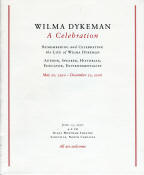 |
| 2 |
1 |
dyk_p_002 |
"She wrote about the environment
before Rachel Carson, and about race relations before the 1960
sit-ins that started the civil rights movement. And her novel about
a strong mountain woman who holds a community together was published
a year before The Feminine Mystique." Martha Waggoner The
Associated Press Raleigh News and Observer Sept. 21, 1999
"Dykeman has been consistently ahead of her time, seeking
subjects and perspectives she has found to be notoriously neglected,
and has been constantly willing to employ new literary genres...".
Rob Neufeld Asheville Citizen-Times July 29, 2001
2007 by Dykeman C. Stokely, James R. Stokely, and Anne Callison
Stokely
|
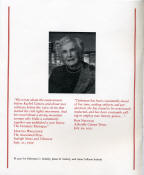 |
| 2 |
1 |
dyk_p_003 |
WILMA DYKEMAN
A Celebration
Opening Remarks: Doug Orr, President Emeritus,
Warren Wilson College
Video of Wilma Dykeman's Life
Eulogy: Dan Matthew's, Rector Emeritus of Trinity
Parish in New York City
Music: Laura Boosinger
Remarks: Fred Chappell
Remarks: John Ehle
Music: Laura Boosinger
Remarks: Sharyn McCrumb
Remarks: Robert Morgan
Music: Laura Boosinger
Remarks: Dianne Tuttle
Closing Remarks: Doug Orr
Refreshments will be provided by Laurey's Catering
in the indoor lobby of the theater directly following the program.
Displays of archival materials describing Wilma
Dykeman's relationship to the University of North Carolina at
Asheville, Berea College, the University of Tennessee, and Warren
Wilson College may be viewed in the lobby.
Wilma Dykeman's books are for sale in the lobby. A
portion of the proceeds will go to the Diana Wortham Theater. |
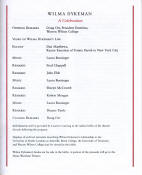 |
| 2 |
1 |
dyk_p_004 |
The Reverend Dr. Daniel P. Matthews Dan Matthews
is the Rector Emeritus of Trinity Church - St. Paul's Chapel in New
York City. Acclaimed for his creative leadership of Wall Street's
landmark parish with its large global and urban ministry, Dr.
Matthews is also recognized for his leadership in interfaith
television. Located directly across from the World Trade Center
site, St. Paul's Chapel, part of the Parish of Trinity Church, was
home to an extraordinary eight-month volunteer relief effort after
terrorist attacks of September 11th, 2001.
Laura Boosinger
Laura Boosinger is a consummate folk musician and entertainer
whose career has spanned nearly two decades of concert performances,
workshops and residencies throughout the eastern United States.
Having graduated from Warren Wilson College (Swannanoa, NC) with a
degree in traditional music and old-time banjo, Laura has shared her
knowledge and love of the music and culture of the southern region
with a wide range of audiences. Laura continues to teach all ages
about the importance of North Carolina culture, presenting
shaped-note workshops, school residencies and banjo classes to
adults who spend their summer vacation with other like-minded
enthusiasts of old-time music.
Fred Chappell Fred Chappell was born on a farm near Canton,
North Carolina. He attended Duke University and began writing
fiction as well as poetry; four novels later, Dagon won the
best foreign book award from the Academie Française.
Thus began a long and stellar career that has produced almost thirty
volumes of poetry and fiction. In 1997, Chappell's remarkable
versatility and skill earned him the title of North Carolina Poet
Laureate. Chappell's excellence in teaching at the University of
North Carolina at Greensboro was recognized by the statewide O. Max
Gardner Award.
John Ehle
The oldest of five children, John Ehle
was raised in Asheville. Ehle earned his B.A. and M.A. at the
University of North Carolina at Chapel Hill, where he also taught
for ten years. John Ehle is the author of seventeen books, eleven
fiction and six nonfiction. As a member of Governor Terry Sanford's
staff in the 1960's, he was the "idea man" and an integral part of
the creation of the North Carolina School of the Arts and the
Governor's School. He went on to serve with the White House Group
for Domestic Affairs and on the First National Council for
Humanities. Ehle also helped start the North Carolina Film Board,
the North Carolina Institute of Outdoor Drama, the North Carolina
Advancement School and the North Carolina School of Science and
Math. |
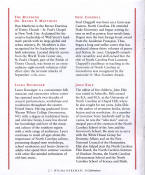 |
| 2 |
1 |
dyk_p_005 |
Sharyn McCrumb
Sharyn McCrumb's award winning novels celebrating the history and
folk-lore of Appalachia have received scholarly acclaim and have
been ranked on the New York Times bestseller lists. McCrumb's
great-grandfathers were circuit preachers in North Carolina's Smokey
Mountains a hundred years ago, riding horseback over the ridges to
preach in a different community each week. McCrumb is a graduate of
the University of North Carolina, and holds an M.A. in English from
Virginia Tech.
Robert Morgan
Robert Morgan was born in Hendersonville, North Carolina and grew
up on the family farm in the Green River valley of the Blue Ridge
Mountains. He started his college years in engineering and applied
mathematics at North Carolina State University, but transferred to
UNC-Chapel Hill and graduated with a B.A. in English. He then
received a Master of Fine Arts degree from UNC-Greensboro. He has
published a score of poetry volumes, novels, and short story
collections. His novel Gap Creek was a selection of the Oprah
Book Club and a New York Times bestseller. Morgan taught English for
over twenty years at Cornell University, and has been a visiting
writer and professor at various North Carolina colleges.
Dianne Tuttle
Dianne Tuttle is a former English teacher, instructional
specialist and writing consultant for the N.C. State Department of
Public Instruction. A close friend of Wilma's, she speaks at her
request.
Douglas M. Orr, Jr.
Doug Orr received a bachelor of arts degree from Davidson
College, and master of business administration and doctorate degrees
from the University of North Carolina at Chapel Hill. From 1968 to
1991, he taught geography and served in leadership roles at the
University of North Carolina at Charlotte. From 1991-2006, he served
as President of Warren Wilson College. He was the principle planner
for Charlotte's University City, an award-winning mixed use project.
Orr's involvement on professional and civic boards includes the
National Council of Independent Colleges and the National Commission
on the Status of Women in Higher Education. |
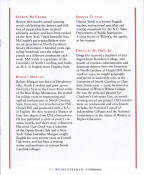 |
| 2 |
1 |
dyk_p_006 |
"An only child, growing up in a little wooded cove
outside Asheville, North Carolina, I suppose my life would have been
described as 'isolated.' Isolated from what? There was the life in
all the forest around me and the stream that gathered in the roots
of trees and under grey ledges and mossy banks where I played and
plunged past our home on its way to the distant
river—and, as my parents told me—eventually to the great
waters of the world." Wilma Dykeman
"[perhaps]...because my mother, Bonnie Cole came of a family
whose roots have been in the French Broad hills for over a century
and a half, and because my father, Willard Dykeman, was drawn in
middle life from New York state to make a new home in the French
Broad country, ...something of both the ancient awareness and the
new-found delight have fused in my perception of this native
region."
Wilma Dykeman in The French Broad |
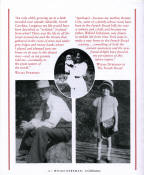 |
| 2 |
1 |
dyk_p_007 |
Throughout her career as an author, speaker,
historian, educator, and environmentalist, Wilma Dykeman wrote 18
works of fiction and non-fiction, gave hundreds of inspirational
speeches, held the office of Tennessee State Historian for 22 years,
taught and served as a trustee at multiple colleges, worked
tirelessly for respect and realism in the public perception of the
southern mountain people, and was a pioneer in bringing national
attention to civil rights, women's issues, and environmental
imperatives.
She also raised two sons, wrote under her maiden name long before
the practice became common, partnered with her husband James Stokely
in a 36-year marriage until his death from a heart attack in 1977,
remained a devoted daughter and companion to her mother until
Bonnie's death in 1992, and worked as a civic leader in eastern
Tennessee and western North Carolina. |
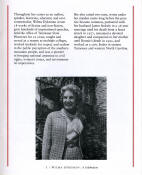 |
| 2 |
1 |
dyk_p_008 |
"Your blood and brain absorbed that
tributary so completely in fact and imagination that the book would
not have been misnamed, 'Hey Feller, How Does It Feel to be a
River?'" Carl Sandburg in letter to Wilma Dykeman, January
1956
"Because, just as the river belongs to no one, it belongs to
everyone—and everyone is held accountable for its health and
condition."
Wilma Dykeman in The French Broad
Wilma Dykeman describes the French Broad as "a river and a
watershed and a way of life where day-before-yesterday and
day-after-tomorrow exist in odd and fascinating harmony." In this
highly acclaimed volume, originally published in the Rivers of
America series, Dykeman's vivid portrait of the French Broad country
encompasses, first, the nation's oldest mountains on whose slopes
the river begins, with their diverse plant and animal life. Here,
most of all, are the richly varied people - the Cherokee for whom
the river was "a source of sustenance, spiritual power, and
pleasure," and the pioneer settlers, who made "every home its own
community" and who built their vital mills and forges on the rivers
tributaries.
The French Broad was published in 1955, seven years before
Rachel Carson published Silent Spring, and Dykeman's
publisher requested that she remove her chapter about the pollution
of the river. Dykeman firmly refused to do so, and instead named the
chapter "Who Killed the French Broad?" to entice readers. She
received more comments about that chapter over the years than any
other part of the book. Karen Cragnolin, executive director of the
non-profit organization RiverLink, has credited Dykeman with
awakening not just the region, but the nation, to the intrinsic
value of our natural resources like water and the mountains. |
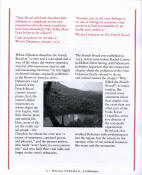 |
| 2 |
1 |
dyk_p_009 |
Dykeman's nonfiction book Neither Black Nor White,
written with James Stokely and published in 1957, won the Sidney
Hillman Award for the best book of the year on civil liberties, race
relations, or world peace. Believing that the greatest service to
the South and the nation in the mid-1950's lay in honest praise and
constructive criticism springing from affectionate concern for the
region, Wilma Dykeman and James Stokely produced this illuminating
personal narrative of the South. Following the 1954 Supreme Court
decision ruling against separate but equal schools, Dykeman and
Stokely traveled through thirteen states to collect this
kaleidoscopic report on Southern views. "...There were so many
articles being written—people came down—those three-week experts
talked to the same people. They went to Atlanta; they went to
Charleston; sometimes they ventured to Richmond or to Houston—but
they all talked to the same people; they all came with their own
stereotype and they went back and they wrote about it. We didn't
recognize this South; it was just their South...We let the South
speak for itself; it had a multitude of voices."
Wilma Dykeman in an interview with Richard Marius, 1989 |
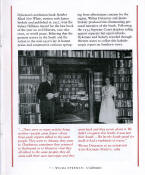 |
| 2 |
1 |
dyk_p_010 |
Wilma Dykeman dedicated her novel The Tall Woman
to her mother, Bonnie Cole Dykeman.
[Wilma Dykeman speaking of what motivated her to write The
Tall Woman]:
"...The unknown person. It is the unknown person who is not
famous, who doesn't become well-known, who influences so much of
life. [In writing The French Broad] I had talked with
wonderful women in the mountains; and I had talked with men who
mothers and whose wives had meant so much to the life of the region.
Who had ever heard of Mrs. Daniel Boone, or Mrs. Davy Crockett, or
those other frontier people? ...And then as [my husband and I] went
across the South [researching Neither Black Nor White in
1957], one of the things that impressed me most were those little
people who risked so much. I know women who were divorced by their
husbands because they supported a hospital for crippled children
that admitted black children...I know a minister in a small town in
Mississippi who made the most simple statements of Christianity
about race one morning. He...lost his pulpit. His name was never in
the papers. He was never celebrated...Out of such experiences grew
my sense that I wanted to write about a woman who had never been
more than fifteen miles from home, who had never been known in
history, but whose life embodied all kinds of creative forces, one
who really cared about the world around
her—the natural world, the human world." |
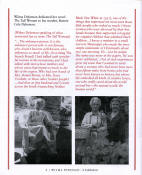 |
| 2 |
1 |
dyk_p_011 |
"None of us is a devil. We're only ignorant and
arrogant. That may be worse. We just stay here, ignorant of our past
and its consequences, arrogant while the waves wash in and threaten
to destroy us." Jonathan Clayburn in Return the Innocent Earth
"Isn't it time to set up a realistic accounting system? One to
include damage to air or water or land, to the health of a human
being?"
Jonathan Clayburn in Return the Innocent Earth
In Return the Innocent Earth, a novel even more timely now
than when it was first published in 1973, Wilma Dykeman interweaves
past and present in a compelling web of memorable relationships. The
Clayburn family perseveres to create a canning company in the Great
Smoky Mountains of the South at the turn of the century, while in
the present, Clayburn descendant, Jon, struggles against cousin and
company-head Stull's amoral vision. The struggle unfolds during a
crisis involving the testing of a new spray to retard growth of
vegetables on the vine. |
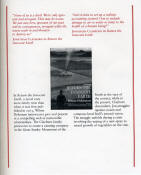 |
| 2 |
1 |
dyk_p_012 |
WILMA DYKEMAN Books
Fiction
The Tall Woman, 1962
The Far Family, 1966
Return the Innocent Earth, 1973
Nonfiction
The French Broad, 1955
Neither Black Nor White (with James Stokely), 1957
Seeds of Southern Change: The Life of Will Alexander (with
James Stokely), 1962
Prophet of Plenty: The First Ninety Years of W.D. Weatherford,
1966
The Border States: North Carolina, Tennessee, Virginia, West
Virginia (with James Stokely), 1968
Look to this Day, 1968
Too Many People, Too Little Love: Edna Rankin McKinnon,
Pioneer for Birth Control, 1974
Tennessee: A Bicentennial History, 1975
Highland Home: The People of the Great Smokies (with son,
Jim Stokely), 1978
With Fire and Sword: The Battle of Kings Mountain, 1978
Tennessee (with photographs by Edward Schell), 1979
Appalachian Mountains (with son, Dykeman Stokely,
photographs by Clyde H. Smith), 1980
Explorations, 1984
Tennessee Woman: An Infinite Variety, 1993
Haunting Memories: Echoes and Images of Tennessee's Past
(with hand-tinted photographs by Christine P. Patterson), 1996 |
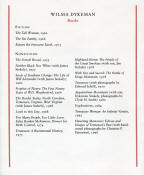 |